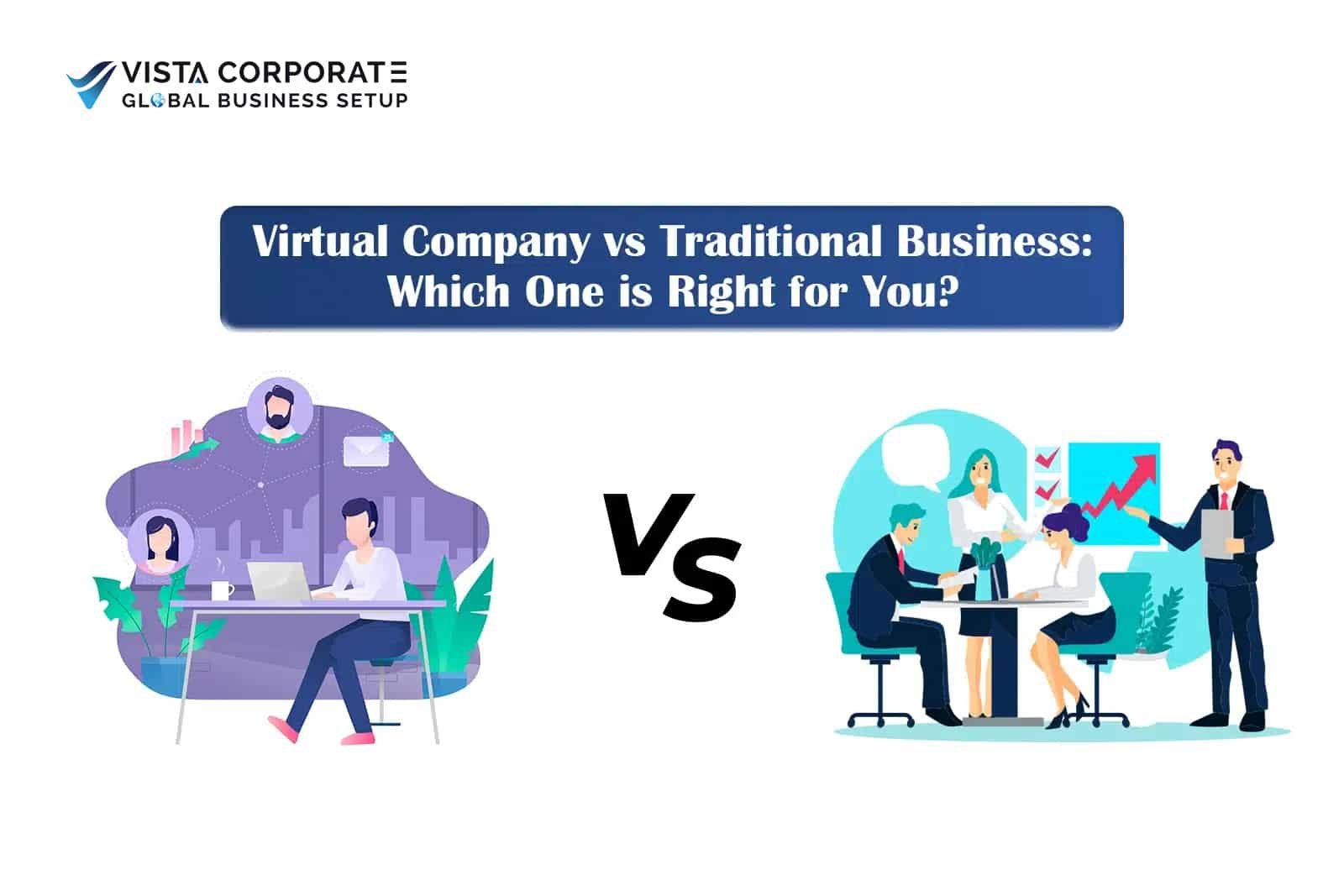
In today’s fast-changing business environment, choosing between a Virtual Company vs Traditional Business is a key decision for entrepreneurs looking to launch or expand in Dubai. Each model offers distinct advantages depending on your business goals, lifestyle, and industry. A Virtual Company allows you to operate fully online, reduce overhead costs, and work with a global team, ideal for freelancers, consultants, and digital entrepreneurs. In contrast, a Traditional Business offers a physical presence in the UAE, the ability to sponsor visas, and stronger access to local markets and corporate banking.
Understanding the differences in setup, cost, legal requirements, and business activities between the two will help you choose the structure that best supports your long-term success in Dubai or beyond.
What is a Virtual Company?
A virtual company operates mostly online without a physical office space. Employees and owners can work from anywhere using the internet and digital tools. This kind of business uses technology to connect, communicate, and deliver services or products.
Virtual companies are becoming very popular because they offer flexibility, lower costs, and access to global markets.
What is a Traditional Business?
A traditional business usually has a physical location like a store, office, or factory. Owners, employees, and customers often meet face-to-face. These businesses rely on in-person interactions and physical presence to operate.
Traditional businesses are still very common and work well for companies needing personal customer service, physical products, or direct contact.
Virtual Company vs Traditional Business: Which One is Right for You?
Choosing between a Virtual Company vs Traditional Business depends on several factors like your business idea, budget, lifestyle, and goals. Below, we compare both to help you make an informed choice.
Cost
Virtual companies generally have lower startup costs since there is no need for rent, utilities, or large office equipment. You mainly invest in computers, software, and internet services.
Traditional businesses often have higher costs because of rent, furniture, electricity, and other physical expenses. But sometimes, being present physically helps attract customers better.
Flexibility
A virtual company offers more flexibility. You can work from home, a cafe, or anywhere with internet access. This flexibility suits entrepreneurs who want to balance work and personal life.
Traditional businesses usually require fixed working hours and locations, which might be less flexible but better for those who prefer structured routines.
Customer Interaction
Traditional businesses allow direct face-to-face interaction with customers, which builds trust and better relationships. This is great for retail stores, restaurants, or service providers needing personal contact.
Virtual companies mostly communicate through calls, emails, or chats. While this saves time and cost, it may lack the personal touch some customers want.
Market Reach
Virtual companies can easily reach customers worldwide without geographical limits. This is ideal for digital products, online services, or consultancy.
Traditional businesses often serve local or regional customers because physical presence is required.
Management Style
Managing a virtual company requires strong communication and trust among team members, who work remotely. Tools like video calls, project management apps, and instant messaging are essential.
Traditional businesses have managers who can supervise employees directly, making it easier to monitor work and resolve issues on the spot.
Stability and Growth
Traditional businesses have long been proven as stable models, especially for local markets. However, scaling may require bigger spaces and more investment.
Virtual companies can scale faster by adding digital resources and hiring remote workers worldwide. But they also face challenges like technology glitches and cybersecurity risks.
Virtual Company vs Traditional Business in Dubai
Here’s a table representation explaining which one can be the right option for you:
| Feature | Virtual Company | Traditional Company |
| Business Model | 100% online and ideal for freelancers, consultants, and digital entrepreneurs | Physical presence with office/shop/warehouse, ideal for retail, services, logistics |
| License Type | Virtual Company License (e.g., Dubai Virtual Commercial City – VCC) | Mainland or Free Zone Trade License |
| Physical Office Requirement | Not required (business can be run remotely) | Required (Ejari or Flexi-desk lease usually needed) |
| Eligible Nationalities | Selected countries only (as per VCC program; UAE nationals not eligible) | All nationalities eligible |
| Bank Account Access | Limited, it may be challenging to open UAE bank accounts | Full access to corporate banking with proper documents |
| Business Activities Allowed | Limited to digital services: marketing, design, tech, consulting, etc. | The wide range includes trading, retail, manufacturing, hospitality, etc. |
| Visa Eligibility | No UAE residency visa included | Eligible for investor/partner/employment visas |
| Tax Registration | Optional (if crossing AED 375,000 annual turnover) | Mandatory if the taxable turnover exceeds the threshold |
| Cost of Setup | Low | High |
| Legal Presence in the UAE | Remote presence only and not suitable for physical operations | Full legal presence with local address |
| Ideal For | Solo entrepreneurs, global freelancers, and small remote teams | Local and international companies with operational needs in Dubai |
| Government Authority | Dubai Economy (VCC platform) | DED (Mainland) or relevant Free Zone Authority |
| Time to Register | Fast | Depends on Setup |
When to Choose a Virtual Company?
- If you want low startup costs and flexible work hours.
- If your business model suits online sales, digital marketing, consulting, or freelance services.
- If you prefer working from anywhere or have family commitments.
- If you want to reach customers globally.
When to Choose a Traditional Business?
- If your business requires physical space, like retail stores or manufacturing units.
- If you value face-to-face interaction with customers.
- If you want to build a local community presence.
- If your product needs hands-on experience or demonstration.
Pro Tips
- Assess your product or service: Is it something customers can buy online, or do they need to visit a physical store?
- Consider your budget: Virtual companies need less initial investment but require good tech skills. Traditional businesses might cost more, but they attract walk-in customers.
- Think about your lifestyle: Do you want flexibility or a fixed routine?
- Plan for the future: Do you want to grow locally or globally?
- Evaluate your tech comfort: Are you comfortable managing remote teams and online tools?
Quiz: Should You Start a Virtual Company or a Traditional Business in Dubai?
Answer the following 10 questions to find out which business model suits you best:
1. Do you want to operate your business fully online?
- A. Yes, I want to run everything remotely.
- B. No, I need a physical location for my business.
2. What’s your initial budget for setup?
- A. I prefer a low-cost setup with minimal expenses.
- B. I’m okay with a higher budget to establish a physical presence.
3. Is personal interaction with customers important to your business?
- A. Not really, I can manage through email, calls, or chats.
- B. Yes, face-to-face interaction is essential.
4. Do you plan to hire a remote team or work solo?
- A. Yes, I prefer remote collaboration or working solo.
- B. No, I plan to build a local in-office team.
5. Are you targeting a local UAE market or global customers?
- A. I’m targeting global customers.
- B. My focus is on serving the local UAE market.
6. How comfortable are you with managing your business digitally (tools, apps, remote systems)?
- A. Very comfortable — I’m tech-savvy.
- B. I prefer in-person systems and traditional operations.
7. Do you need UAE residency or investor visas?
- A. No, it’s not a priority right now.
- B. Yes, I want to live or invest in the UAE long-term.
8. Is your business based on physical goods or services?
- A. It’s mainly digital services or online products.
- B. It involves physical goods, retail, or in-person services.
9. How important is flexibility in your daily schedule?
- A. Very important — I need to set my own hours and location.
- B. Less important — I’m okay with a fixed routine.
10. Do you want to scale internationally or grow locally first?
- A. International expansion is my goal.
- B. I want to establish myself locally first.
Results:
👉 Mostly A’s – Virtual Company is Right for You!
You’re a flexible, tech-friendly entrepreneur who prefers online operations, low overhead costs, and global opportunities. A virtual company setup in Dubai fits your goals.
👉 Mostly B’s – Traditional Business is a Better Fit!
You value structure, local presence, and customer interaction. A traditional business setup with a physical office or store in Dubai will best support your needs.
Conclusion
Choosing between a Virtual Company vs Traditional Business depends on your unique needs and goals. Virtual companies offer flexibility, lower costs, and a global reach, making them perfect for many modern entrepreneurs. Traditional businesses provide physical presence, personal interaction, and stability, which remain important in many industries.
Think about your product, budget, lifestyle, and market when deciding. Whichever you choose, success comes from good planning, smart management, and understanding your customers.
FAQs
Q1: What are the main differences between a virtual company vs traditional business?
The key differences lie in physical presence, operations, and scalability. A virtual company operates entirely online, often with a remote team and no need for a physical office or storefront. It relies on digital tools for communication, project management, and customer interaction.
In contrast, a traditional business requires a physical location, like a shop, office, or warehouse, and involves face-to-face interactions with clients, staff, or suppliers. Traditional businesses are ideal for product-based models, while virtual setups are suited for services, tech, or content-based ventures.
Q2: Which model is more cost-effective, a virtual company or a traditional business?
Generally, virtual companies are more cost-effective, especially during the startup phase. They eliminate major costs like rent, office setup, utilities, and daily overheads. Business owners only need to invest in software, domain hosting, and online tools.
Traditional businesses, however, involve higher fixed and variable costs such as leasing commercial space, obtaining Ejari (tenancy), furnishing, and staffing. While these may result in stronger local visibility, they can significantly increase financial commitment, especially in Dubai.
Q3: Can a traditional business become a virtual company?
Yes, many traditional businesses are adapting virtual elements to stay competitive. For instance, retail stores are launching e-commerce platforms, consultants are offering Zoom-based sessions, and service providers are going hybrid to serve both walk-in and online customers.
Transitioning to a virtual model doesn’t necessarily mean shutting down your physical presence. It can mean integrating remote operations, digital tools, and flexible work policies. Dubai’s digital infrastructure supports this shift through licensing options and tech-friendly policies.
Q4: How does customer trust differ between virtual companies and traditional businesses?
Traditional businesses tend to build trust faster through physical presence, personal interactions, and visibility in local markets. Customers feel more secure dealing with businesses they can visit or call directly. Virtual companies, on the other hand, build trust through digital reputation, such as social proof (reviews/testimonials), a professional website, secure payment gateways, and consistent online support.
While both models can be equally trustworthy, virtual companies must invest more effort in branding, transparency, and digital engagement.
Q5: Which is better for global expansion, a virtual company or a traditional business?
A virtual company is generally better suited for global expansion due to its borderless structure. Since operations are digital, scaling to new regions is faster and more affordable, especially for businesses in tech, media, consulting, or e-commerce. It allows owners to tap into international markets without setting up physical branches. In contrast, traditional businesses may require local registrations, physical stores, or warehouses in each new country, which involves time and significant capital. However, for industries like manufacturing or logistics, a traditional setup may still be essential.




